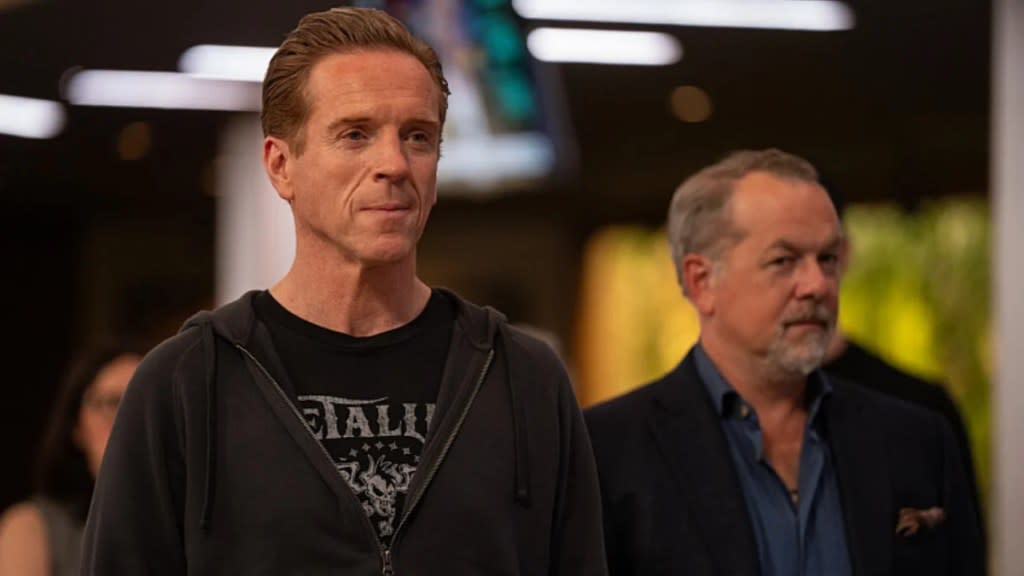‘Billions’ Creators Break Down Whether Fiery Series Finale Was ‘Happy’ Or ‘Inevitable’

The series finale for “Billions” was always meant for the diehard fans of the long-running Showtime drama. At “first blush” it’s a relatively happy ending. Relationships aren’t irreparably damaged and nearly every fan favorite character ends up as rich as they’ve always been.
But series co-creator and executive producer Brian Koppelman encouraged TheWrap to “close our eyes for a minute and think about it.” By the end of “Admirals Fund,” Bobby Axelrod (Damian Lewis) is exactly where he started, an obscenely rich man behind a desk barking orders at his underlings to make him more money.
“Is that a happy ending? Or is that an inevitable ending?” Koppelman asked. “Is that him accepting the limitations of who he is?”
“In ‘The Sopranos,’ people get killed. In our show when people get killed, they lose their money. And some people make more,” series co-creator and executive producer David Levien joked to TheWrap.
The finale of “Billions” makes a point of showcasing a satisfying ending for every major character. Yet so many of those endings feel like an inevitable return to the beginning. Axe returns to become head of his highly successful hedge fund. Chuck Rhoades (Paul Giamatti) ends without his wife but with his true love — investigating white collar financial crimes — by his side. Even the disgraced villain Prince (Corey Stoll) has an ending that feels inevitable to his character, vowing to return with even more money and power. It’s a cycle that mirrors the very commentary on cycling money and power “Billions” has commented on from the beginning.
Very few characters have truly grown by the series’ end. The exceptions are Wendy (Maggie Siff), who distances herself from not one but two toxic and powerful men in her life; Taylor (Asia Kate Dillon), who leaves this cutthroat culture behind to found The Taylor Mason Foundation; and Bryan (Toby Leonard Moore), who gets a redemption arc after his stint in prison.
“Maybe Ryan and Taylor have a chance to end up the best of themselves,” Levien mused.
Constructing these endpoints that at once felt surprising yet inevitable was of the upmost importance for the creative team, a lesson taken from Quentin Tarantino. Levien and Koppelman likened the final season to a beloved ride. “If you’ve written a rollercoaster a couple of times, you start leaning before the turn,” Levien said.
With that ethos in mind, from the midpoint of the season on the team dedicated the final episodes to “really serve” diehard fans.
“The characters have been on the show for a long time. I think they’re less lonely than they were at the beginning, less isolated and more connected to the world,” Koppelman said. “That, in a way, is a happier place for them to be.”
Yet, by the very nature of this show, a “happy” ending for the obscenely wealthy comes at a heavy cost to the rest of the world.
“We all live in the same country, in the same world. As Americans, we all make this mistake over and over again, in our real lives, of putting our faith in people who have amassed these large sums of money, even when we have movements against it over and over again,” Koppleman said. These figures fascinate us and we become “engaged in their fight for success.”
“Our question, the whole time, has been what drives someone who has everything to need everything, plus one more? And why are the rest of us compelled by that? What’s that journey standing in for us?” Koppelman said. “Is it God? Is it royalty?”
Koppelman noted that Netflix’s “The Crown” does “an incredible job” of exploring these questions as well.
“We don’t have a monarchy in America, and politicians don’t really serve that role. So what we have are billionaires,” Koppelman said.
The post ‘Billions’ Creators Break Down Whether Fiery Series Finale Was ‘Happy’ Or ‘Inevitable’ appeared first on TheWrap.


